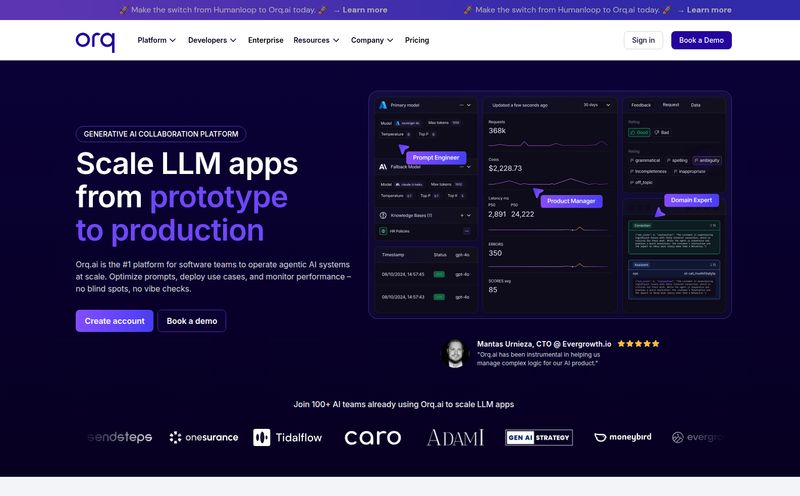We've all been there. You're deep in a project, iterating on the perfect prompt for GPT-4, feeling like a genius. You run your scripts, get amazing results, and then... you check your OpenAI billing dashboard. Ouch. That little moment of panic when you see the cost spiraling is a rite of passage in the AI world, isn't it? It's the hidden tax on innovation.
The culprit? Tokens. These little chunks of text are the secret currency of the AI universe, and managing them is the difference between a successful project and an unexpectedly expensive hobby. For ages, I've been copy-pasting code into a Python script with the tiktoken library to get a precise count. It works, but it’s clunky. So when I stumbled upon a simple web tool called Token Counter, I was intrigued. A dedicated tool just for counting tokens and estimating costs? Sounds almost too good to be true. I decided to give it a spin.
First Off, What on Earth is a "Token"?
Before we get into the tool itself, let’s clear this up. If you're new to this space, the word "token" can be confusing. It’s not a word. It’s not a character. It's... something in between.
Think of it like this: an AI model doesn’t read "The quick brown fox." It breaks it down into predictable pieces it can understand. So "The quick brown fox" might become ["The", "Ġquick", "Ġbrown", "Ġfox"]. Four tokens. But a more complex word like "tokenization" might become ["token", "ization"]. Two tokens. It's a system based on common character sequences.
The tricky part is that every model family has its own way of doing this. How OpenAI's GPT-4 counts tokens is different from how Anthropic's Claude does. This is why a reliable token counting tool is so damn useful. It's the pocket calculator for your AI spending.
A Look Inside the Token Counter
So, what’s it like to actually use this thing? The beauty is in its simplicity. There’s no complex dashboard or a million buttons. You’re greeted with a clean, plain text input box. That’s it.
You paste your prompt, your article, your code snippet, whatever, and it instantly spits out the numbers. You get a character count, a word count, and—most importantly—the token count for a whole list of different AI models. It’s all real-time, which is incredibly satisfying to watch as you type and edit your prompt, seeing the numbers tick up and down.

Visit Token Counter
And here’s the kicker: it doesn’t just give you the token count. It gives you a cost estimate. You can see exactly what that 1,500-token prompt is going to cost you on GPT-4 versus GPT-3.5-Turbo. For anyone trying to manage an AI budget, this is gold.
The Good Stuff That Makes It Worthwhile
After playing around with it for a few days, a few things really stood out to me. This isn't just another half-baked web app; there's some solid thinking behind it.
Accuracy Where It Counts Most: OpenAI
The biggest win for me is its accuracy with OpenAI models. The documentation (and my own tests) confirm it uses the official tiktoken library. This is the ground truth for OpenAI tokenization. Why does this matter? Because using a less accurate counter is like using a wonky measuring cup when you're baking. You'll think you have enough, but you’ll end up with a mess. With Token Counter, what you see is what you’ll get billed for. Peace of mind is a wonderful thing.
Real-Time Feedback is a Game Changer
I can't overstate how useful the real-time counting and cost estimation is. I was recently working on a complex summarization prompt and was trying to stay under a certain token limit to keep my API calls fast and cheap. Instead of pasting back and forth into my terminal, I just had Token Counter open in another tab. I could tweak a sentence here, rephrase a paragraph there, and instantly see the impact on my token count and my wallet. It changes your entire workflow from reactive (checking costs after the fact) to proactive (controlling costs as you create).
It Speaks More Than Just English
While my work is mostly in English, I was curious about its multi-language support. I threw in some Spanish and Japanese text, and it handled them without breaking a sweat. Given that tokens are based on character chunks, not just English words, this is esssential for global applications. It's a solid feature for teams working with international content.
The Not-So-Good Stuff: Room for Improvement
Okay, no tool is perfect. And I wouldn't be giving you an honest review if I didn't point out the rough edges. There are a few things I found myself wishing for.
The Anthropic and Google Models Feel a Bit Left Behind
While it's fantastic for OpenAI, the tool notes that its tokenization for other models, like Anthropic's Claude, relies on an older, less precise method. For Claude, for instance, it seems to be using a more generic word-count-based estimate rather than a model-specific tokenizer. It's still a decent ballpark figure, but it's not the pinpoint accuracy you get for GPT models. If you’re a heavy Claude user, you’ll want to double-check your numbers with Anthropic’s own tools. Same goes for Google's Gemini models.
It's a Manual World: No API
This is probably the biggest drawback for serious developers. There's no API. You can't programmatically send text to Token Counter and get a count back. This means you can't integrate it into your automated workflows, CI/CD pipelines, or custom applications. It's strictly a manual, copy-and-paste tool. For quick checks, it's fine. For anything at scale, you'll still be reaching for the tiktoken library in your own code.
I Want to See the Tokens!
This is more of a personal wish, a nitpick really. I'm a visual person. I love tools like OpenAI’s own Tokenizer which actually shows you how your text is being broken down and color-codes the tokens. It helps you build an intuition for how tokenization works. Token Counter just gives you the final number. It’s efficient, but it lacks that educational, "under-the-hood" view that can be so helpful.
So, What's the Price Tag?
Here's the best part. From everything I can see, Token Counter is completely free to use. There's no pricing page, no sign-up required, no "pro" version hiding behind a paywall. In a world where every useful dev tool seems to be moving to a subscription model, a free, functional utility is a breath of fresh air. This makes it a complete no-brainer to bookmark and use.
My Verdict: Who Should Be Using Token Counter?
So, who is this for? Despite its limitations, the audience is actually pretty broad.
- AI Developers & Engineers: Perfect for quick, on-the-fly prompt checking and cost estimation during development. It’s faster than running a local script for a one-off check.
- Content Creators & Marketers: If you're using AI APIs to generate blog posts, social media updates, or marketing copy, this is your new best friend for budget management.
- AI Enthusiasts & Hobbyists: For anyone learning about large language models, this is a fantastic, risk-free way to understand the cost implications of your prompts before you ever spend a dime.
- Students & Researchers: When you're working with large datasets or running academic experiments, keeping an eye on potential costs is critical. This tool helps you do that easily.
It’s not the all-in-one, enterprise-grade solution. But it's not trying to be. It's a screwdriver in a world of complex power tools – simple, reliable, and does one job really well.
Frequently Asked Questions
Is Token Counter accurate for all AI models?
It's highly accurate for OpenAI models like GPT-4 and GPT-3.5 because it uses the official tiktoken library. For other models like Anthropic's Claude or Google's Gemini, it uses an estimation method, so the count is more of a ballpark figure and may not be as precise.
Why is counting tokens so important?
Two main reasons: cost and context windows. AI providers like OpenAI charge you per token (for both input and output). Counting tokens helps you estimate and control costs. Also, every model has a maximum token limit (its "context window"). If your prompt and the expected response exceed this limit, the model will fail. Managing token count is key to staying within these limits.
Can I use Token Counter for programming code?
Yes, you can. You can paste code directly into the text box. It will count the tokens just like it does with plain text. This is super useful for checking the size of prompts that include code snippets for models like GPT-4, which are great at coding tasks.
Is Token Counter free?
Yes, based on all available information, Token Counter is a completely free tool. There are no fees, subscriptions, or sign-ups required to use its core features.
Does Token Counter offer an API or a browser extension?
Currently, it does not. It functions as a web-based tool where you manually paste text. There is no public API for integration into other applications or a browser extension for on-page counting.
The Final Word on Token Counter
In the ever-growing toolkit of an AI professional, there's a definite place for a tool like Token Counter. It’s a simple, elegant solution to a very common problem: understanding and controlling AI costs. It's not perfect—the lack of an API and less accurate counting for non-OpenAI models are notable drawbacks.
But for its primary purpose—giving you a quick, accurate, and free way to count tokens and estimate costs for OpenAI models—it absolutely nails it. I've already bookmarked it, and it's become part of my daily workflow. It saves me time, it saves me mental energy, and it almost certainly will save me some money down the line. And you can’t really ask for more than that from a free tool.
References and Sources
For those who want to dig a little deeper into the concepts discussed:
- OpenAI's
tiktokenLibrary: The open-source tokenizer used for GPT models. You can find it on GitHub. - OpenAI's Visual Tokenizer Tool: A great educational tool to see how text is broken into tokens. Check it out here.
- OpenAI API Pricing: To cross-reference the cost estimates. View the official pricing page.
- Anthropic API Pricing: For those working with Claude models. View their pricing details.



